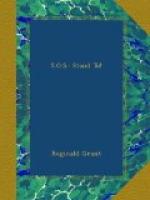It was the fourth day of the second battle of Ypres. I was in charge of my subsection at the guns and the men wanted water. I volunteered and went to a farmhouse 150 yards off, got the water and had started back for the guns. I had just stepped outside the door of the farmhouse when Kr-kr-kr-p! a huge shell came over and blew the gun and gun crew into kingdom come. A French captain was standing twenty feet from the door and, following the report, I started for our gun. I had just taken a step or two when another monster of death came hurtling through the air, straight for me, as I thought, but, instead, it was a message for the French soldier; it got him squarely, leaving not a fragment of his body to be seen.
Immediately after the death of our gun crew and the French captain our gun position was moved, and that same evening after supper, consisting of the usual bread, jam and tea, Walter Hope and I were on our way to the dugout. When half-way there a sudden emptiness entered into my life and the next thing I knew I was being lifted on to a stretcher. I rebelled and got to my feet. What had happened was this, as told me by one of the boys who was standing a short distance off,—a shell had come and exploded almost at my feet, throwing me in the air for a distance, as he said, of fully twenty feet. It is impossible for me to personally make an estimate of the distance, as I was unconscious when I went up and when I came down.
When I recovered my senses, Hope was hopping around holding his right hand with his left and exclaiming like a madman. His hand had been almost severed by a fragment from the shell and was hanging to the wrist by a shred. He ran to the cookhouse and the cook advised him to go at once to the dressing station, as he couldn’t do anything for him; instead, in his frenzy, he ran to the gun pits, going from one to the other, looking for help. Every man there wanted to help him, but he wouldn’t and couldn’t stand still; the concussion of the shell had affected his brain and this accounted for his ungovernableness. Then a few of us grabbed him and I bandaged it as best I could, walked over to the road with him and started him on his way to the dressing station; I could go no further, as we had commenced firing, and he made his way alone. When nearing the station his senses completely left him for the time and he plucked off his hanging hand and threw it from him. The poor lad was then taken into the station, properly attended to and sent to England.
Thankful am I to tell that he came through all right and is now working in Toronto earning his living by writing with his left hand, which he has learned to manipulate with practically the same agility the lost member possessed. We were deeply regretful at the loss of Hope from the crowd—fearless Hope, as he was known, and, sometimes, hopeless Hope—because never in all my experience have I seen a man who was so utterly regardless of danger; he would expose himself to what seemed certain death, and, as luck would have it, he got his blighty at a place that ordinarily would be considered about as safe from harm as could be found.




